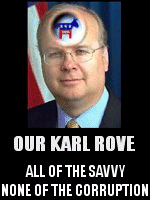Barack,
There are two success factors for you in your first debate with John McCain:
- Make him look unelectable.
- Make him look unelectable.
I bet you were thinking that one of them was going to be "make yourself look electable." However, that would be the politics of hope, and as your campaign as already acknowledged, that page has turned. This is no longer about whether America can deal with a black candidate, whether you're experienced or not, or how "liberal" you might be.
Now the race is down to simply what kind of President Americans want. And because you are who you are (thoughtful, courteous, silently tough, contemplative, nuanced), there's really no point in emphasizing these characteristics because these are not what Americans generally look for in their President.
Americans want our presidents to be passionate, ideological, visionary, and likable. John McCain actually fits this bill pretty well (other than the visionary and some ideological bits) -- which explains why he is even above 20% in the polls as a Republican this season. For those who are already in your camp, you clearly are seen having these assets as well. But for those key 10% undecideds (and possible converts) it's critical to acknowledge that these people are not fully enamored enough with your candidacy, and may still be drawn to McCain's folksy, narrative-oriented style. When you boil it all down, these debates are for those remaining 10%, so best to tailor your debate for them.
Which, ironically, puts you in the deficit column in terms of who will "win" the debate. This is why your two success factors are about being on offense, and are focused around tearing down vs. building up. And, if you do it right, you will not only win the debate, you will effectively end the race by opening up an 8-10 point lead.
Let's look at John McCain's attributes that make him seem like he might be a better President to undecided voters, and what we can do to eviscerate them:
Passion
John's passion is contagious because he makes you feel he's really going to do something about it. It's just how interpersonal communications work.
Passionate behavior can be undermined by creating a contrast: Passion only works when it matches the perceived need for the amount of energy being expended on a topic. There are many situations in life when a passionate person losses out to the measured, reasoned and sober person because the latter made the former appear to let their emotions get the best of them. In other words, the passionate person can be made to be seen as someone who loses sight of the big picture because their emotions don't allow them to see clearly. To this end, there are plenty of opportunities to make McCain seem too emotional. Little quips like "I see John is quite passionate about this subject" or "I think we all need to settle down a little so we can get our heads around this problem."
Ideology
John is a traditional Republican candidate in one fundamental way: he has a strong ideology in terms of foreign policy, and has a basic "not my job" approach to domestic policies. Like most modern Republicans, John believes that the government should get deeply involved in how all other countries govern themselves, but should stay out of America's business.
This can be deconstructed and turned against him in two very easy ways:
- On foreign policy, simply argue that John is an ideologue just like George Bush and Dick Cheney; that all three of them wanted to go to war with Iraq right after 9/11, and focused more on their "grand scheme" than the safety, security, and budget of the American people.
- On domestic policy, it's quite easy to argue that the last thing America needs right now is a "limited government" President who wants the government to get out of the way. People all over this nation are demanding better health care, safer communities, better education and, of course, a reliable and trustworthy financial industry. Government has been "getting out of the way" for eight years, and now we're seeing firsthand how the Republican approach to domestic issues pans out.
Likability
This will be the most difficult attribute to undermine. John is charismatic, has a good sense of humor, and definitely comes off with a folksy wisdom vibe.
What I say about McCain's likability is: easy come, easy go. For as much John gets ahead with his likability score, he can also completely undermine it with a single eruption. And everyone knows what I mean by an eruption. Your job is to get him to erupt. To do so, you need to infuriate him by asserting something that he knows to be false, but will have a difficult time defending because it will force him off his talking points:
- Challenge his wisdom and his experience in foreign affairs (make him tell the nation that he has spent almost 30 years crawling around Washington).
- Challenge his ability to lead us out of an economic crisis (make him explain his free-market, low-regulation philosophy).
- Challenge his notion of "Country First" when he picks a VP candidate who is clearly not ready to be President, but who has energized his Republican base. In other words, he's put winning first, country second.
Of course during the debate you will be dapper, substantive and have the right answers for all of the looming challenges that we face. This is a given -- nobody as far as I can see is questioning your intellect or your relative youth. The challenge for you, however, is to also view the debate through the personality lens: Despite the conventional wisdom in Democratic circles, it's not entirely about how well you address the issues -- it's about how these 10% undecideds compare the two of you as people, and who they think best fits their model of an ideal President.
